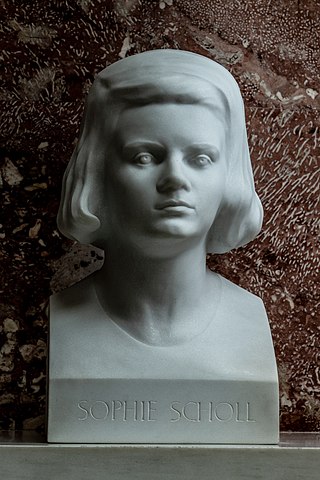March is Women’s History Month and I’m writing about a woman a day all month long to highlight some of the women I have found inspirational in my life.
We all like to think when dangers arrives we will stand up and do the right thing. Most of us will never be tested in dangerous situations where our lives are at stake, but Sophie Scholl, a 21 year old student at the University of Munich, was and stood up for what she thought was right.
As Sophie moved through the education system in Nazi Germany, she became disillusioned with the constant indoctrination of children. However, her only route to a college education meant she needed to endure more propaganda serving a six-month stint in the National Labor Service.
Sophie attended the University of Munich with her brother, Hans. He introduced her to his friends who found similar interests in art, music, literature, philosophy, and theology. They attended concerts, plays, and lectures.
Opportunities arose for Sophie to meet several artists, writers, and philosophers. Her intellectual circle pondered philosophical questions, including how a person should act under a dictatorship. The Nazi regime was still calling. Sophie was required to complete war service.
During the summer of 1942, she completed her service in a metallurgical plant in Ulm while her father was in prison. He made a critical remark about Hitler to a coworker and that could not be tolerated in the regime.
Hans helped found the White Rose group after he and his friends had read letters from Fritz Hartnagel, Sophie’s boyfriend about Nazi war crimes on the eastern front. He had witnessed Soviet POWs shot in the head and dumped in mass graves and learned about the mass killings of Jews.
The White Rose group practiced passive resistance with an anonymous leaflet campaign that called for active opposition to the Nazi government. When Sophie found a leaflet on campus, she knew her brother had helped write it. She joined the group soon after.
The White Rose Group’s campaign had spread to the greater Munich area, secret messengers carried copies to other cities, mainly in southern Germany.
Six leaflets were created by the group totally 15,000 copies. The leaflets denounced regime crimes and oppression and called for resistance. Their second leaflet specifically denounced the persecution and murder of Jews.
Scholl helped write, copy, distribute, and mail pamphlets and managed the group’s finances. They were arrested for distributing their sixth leaflet.
The White Rose group was active from their start in Munich on June 27, 1942 until the core of the group was arrested on February 18, 1943. Hans and Sophie had left copies of the pamphlet outside lecture rooms. Sophie noticed a few copies left in the suitcase they transported the pamphlet in. She tossed them from the top floor atrium of the main university building.
Unfortunately, a maintenance man, Jakob Schmid, saw them. Hans and Sophie were arrested. Hans had a draft of a seventh pamphlet, written by Christoph Probst. Sophie had gotten rid of any incriminating evidence before she was taken into custody. Hans tore up the draft and attempted to eat it. The Gestapo recovered enough of it make a match to Probst’s other writings found in Hans’s apartment.
Hans confessed. Interrogator Robert Mohr believed Sophie to be innocent. Sophie, however, attempted to take full responsibility to protect the members of the White Rose.
Sophie and her cohorts endured a show trial by the Volksgerichtshof, or people’s court, before being sentenced. Defendants were not allowed to speak, but Sophie interrupted Judge Roland Freisler in her trial many times.
During her trial on Feb. 21, 1943, Sophie interrupted the judge and said, “Somebody, after all, had to make a start. What we wrote and said is also believed by many others. They just don’t dare express themselves as we did.” This was their only testimony.
Sophie, Hans, and Christoph were convicted of high treason and sentenced to death. Prison officials noted her courage as she walked toward her execution.
Sophie Scholl was 21 years old when she was beheaded via guillotine on Feb. 22, 1943, four days after she was arrested and a few hours after the verdict was read.
Her last words were recorded as,
“How can we expect righteousness to prevail when there is hardly anyone willing to give himself up individually to a righteous cause? Such a fine, sunny day, and I have to go. But how many have to die on the battlefield in these days, how many young, promising lives. What does my death matter, if through us, thousands of people are awakened and stirred to action?”
The sixth pamphlet was smuggled out of Germany by German jurist Helmuth James Graf von Moltke via Scandinavia and to the United Kingdom. It was then used by the Allied Forces. Millions of copies of the pamphlet, now called, “The Manifesto of the Students of Munich,” were dropped over Germany in mid-1943.
On page 13, of the Feb. 22, 1993 edition of Newsday, Playwright Lillian Garratt-Groag said, “It is possibly the most spectacular moment of resistance that I can think of in the twentieth century… The fact that five little kids, in the mouth of the wolf, where it really counted, had the tremendous courage to do what they did, is spectacular to me. I know that the world is better for them having been there, but I do not know why.”
The six pamphlets are available in English via this pdf.


Brandon Nelson
Wow. Great start to the series. I look forward to reading more.
Jerry Lewis
What a tremendous writing, Irene. I have just finished talking with a former German exchange student. We were his host parents in 1992. This story and others like it still make strange bedfellows with the young people of Germany. May we ever remember and resist what could so easily lead us into similar times.